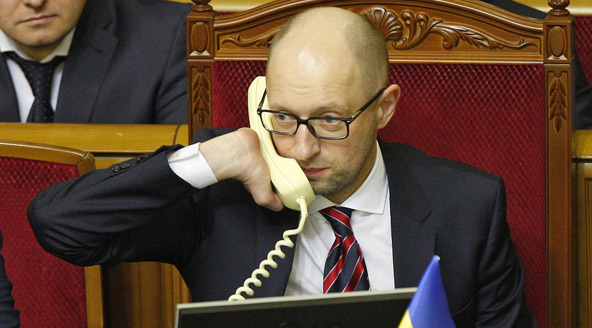For months, Ukrainian politics has been dominated by an escalating confrontation between President Petro Poroshenko and Prime Minister Arseniy Yatsenyuk. On February 16, the conflict came to a head in Ukraine’s parliament, the Verkhovna Rada—but nothing happened.
Shortly after a majority of parliamentarians declared the work of Yatsenyuk’s government “unsatisfactory,” the beleaguered prime minister survived a vote of no confidence. His survival immediately led to fevered speculation as to what deals may have been done to keep him in his post.
Yatsenyuk and Poroshenko came to head Ukraine’s two most powerful positions back in the spring of 2014, at the height of Ukraine’s Maidan revolution. But the two men have been at odds since the end of last year.
Yatsenyuk came under sustained attack from the Ukrainian media. Especially vocal was former Georgian president Mikheil Saakashvili, appointed by Poroshenko to be governor of Odessa Region, who openly accused the prime minister and his associates of corruption (while exempting anyone close to the president from similar charges).
Meanwhile, in the Rada, deputies loyal to the president continually torpedoed legislative initiatives from the government. Approval ratings for Yatsenyuk and his People’s Front party tumbled from around 20 percent to almost zero. The prime minister was protected only by the international environment. Ukraine’s Western partners and donors worry that early elections would destabilize the country and the visit by U.S. Vice President Joe Biden in December took some of the heat off Yatsenyuk.
Nonetheless, in January, the president’s team began to agitate for the resignation of two government officials close to Yatsenyuk, Interior Minister Arsen Avakov and Deputy Prime Minister Vyacheslav Kyrylenko. They also lobbied for a Poroshenko loyalist, Vitaliy Kovalchuk, to take the vacant job of first deputy prime minister. The prime minister was basically presented with an ultimatum: either he would accept the president’s proposals for a government reshuffle, or he would resign.
Yatsenyuk was given some breathing space by the unexpected resignation of economy minister Aivaras Abromavicius, who stepped down on February 3 in a very public demarche. Abromavicius pointed the finger at Ihor Kononenko, a parliamentary deputy and close associate of Poroshenko, saying Kononenko had tried to force him to accept people for appointments in the ministry.
Western governments were angry. Christine Lagarde, head of the International Monetary Fund, warned that Ukraine’s $18 billion bailout program might be suspended “without a substantial new effort to invigorate governance reforms and fight corruption.”
Under Western fire, Poroshenko made a peace offering and backed off from his demands for the resignation of Avakov and the appointment of Kovalchuk. Yatsenyuk regained the initiative and persuaded four other ministers who had been threatening to leave his government to stay in their positions.
But this was only a brief pause in the fight. On the eve of a parliamentary session on February 16, where Yatsenyuk was due to report on his program, deputies from Poroshenko’s party decided to declare the government’s work “unsatisfactory” and begin to collect signatures for a no-confidence vote against Yatsenyuk. At the same time, according to deputies present at the meeting, President Poroshenko himself warned that a no-confidence vote might have negative consequences, including early elections and problems with Ukraine’s international creditors.
Earlier, two other parties, the Samopomich (“Self-Reliance”) party led by the mayor of Lviv Andriy Sadovyi and the group led by former prime minister Yulia Timoshenko, had declared that either Yatsenyuk should resign or there should be early parliamentary elections.
To an outsider, it looked as though Yatsenyuk was now doomed. The president appeared to drive another nail into his political coffin when, a few hours before the parliamentary vote, he said there was “a need for a full reset of the government”—words that the Ukrainian media interpreted as a call for Yatsenyuk to step down.
Yet, as the key parliamentary session progressed, things played out rather differently. A total of 247 deputies voted for the nonbinding resolution that the government’s work was “unsatisfactory.” But before the second vote, on no confidence in the prime minister, many deputies abruptly left the parliamentary chamber. That resolution received only 194 votes, well short of the number needed to oust Yatsenyuk.
The sudden parliamentary about-turn means that Yatsenyuk will survive as prime minister for at least another six months. It naturally spawned a number of allegations of foul play. Yulia Timoshenko instantly claimed that deputies who had refused to vote down the prime minister had been bought off, with sums of up to 1 million dollars.
The largest number of sudden absentees came from President Poroshenko’s party, leading to speculation that the president did not really want to get rid of his prime minister and all the threats against him were merely a show.
Mustafa Nayyem, one of the leaders of the Maidan movement and now a parliamentary deputy, said the second vote was the result of a deal between Ukraine’s oligarchs, the president, and the prime minister.
Nayyem’s claim is supported by the fact that deputies who are declared members of the opposition, such as those loyal to oligarch Rinat Akhmetov, did not cast their votes. Likewise, parliamentarians in the Revival group close to another oligarch, Igor Kolomoisky, also supported Yatsenyuk. The vote was therefore a tactical political action that had nothing to do with long-term party allegiances.
It will not be hard to prove whether or not there was indeed a secret deal to keep Yatsenyuk in office. We will soon see whom the prime minister appoints to key economic positions in his cabinet and whether these appointees are figures approved by the president and the oligarchs.
